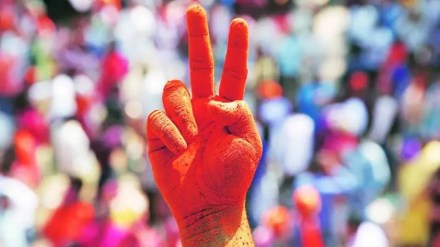A year that began with the Bharatiya Janata Party getting a foothold in the three northeastern states of Tripura, Meghalaya and Nagaland through its alliance partners, ended with a high as it scooped three crucial Hindi-heartland states in the elections held in November.
While Karnataka proved to be a disaster for the party which banked on Prime Minister Narendra Modi’s popularity to do the magic for it once again, the Supreme Court’s verdict upholding the Centre’s August 5, 2019, decision to scrap Article 370 of the Constitution and revoking the special status of Jammu and Kashmir proved to be a big boost to its core ideological agenda.
Jammu and Kashmir has historically taken prominent space in the BJP’s agenda of cultural nationalism and the abrogation of Article 370 was seen as the party delivering on one of its biggest promises which had featured on its poll manifesto for successive elections. Perhaps the sole remaining historical agenda that the party has yet to deliver is the Uniform Civil Code.
Elsewhere, the party’s Hindutva agenda raced ahead as the Ayodhya verdict paved the way for similar challenges in Kashi and Mathura. The Kashi Vishwanath Temple-Gyanvapi Mosque dispute made significant progress during the year. The Allahabad High Court allowed a scientific survey of the mosque premises and set a six-month deadline for the Varanasi court to complete proceedings in a suit filed by Hindu worshippers seeking possession of the mosque complex. Crucially, the court also ruled that the original suit of 1991 was not barred by the Places of Worship Act 1991.
Also Read: ASI submits sealed report on Gyanvapi mosque survey in Varanasi court
While the year saw the BJP dragging its feet on articulating its stand on the Places of Worship Act, developments in the Kashi Vishwanath and Mathura Krishna Janmabhoomi cases have been perceived as victories for the BJP’s Hindutva agenda. Notably, a scientific survey on the lines of the one conducted by the Archaeological Survey of India in the Gyanvapi case has been ordered in the Krishna Janmabhoomi suit and is likely to be taken up soon.
On the electoral front, Karnataka and Telangana proved to be disappointments for the BJP in elections that were fought in the name of welfarism. The Congress made tall promises of freebies, which it termed as its guarantees, as a counter to the polarising campaign led by the BJP. The Congress swept the elections, winning 136 of the 224 Assembly seats in the state while the BJP was reduced to 66 seats.
Also Read: Krishna Janmabhoomi case: Allahabad HC gives nod for Shahi Idgah survey in Mathura
The BJP, which entered the elections without a chief ministerial face, banked on PM Modi again in MP, Chhattisgarh and Rajasthan elections. The Karnataka strategy, however, yielded positive results in the heartland as “Modi Ki Guarantee” prevailed over the Congress’ poll promises in the three states. The elections came as a big boost for the BJP, giving it a political high ground against its competitors in the run-up to the Lok Sabha elections.
Crucially, the people’s verdict in the heartland, a region where the BJP draws a majority of its strength, came as a referendum on the joint Opposition’s caste census play. Caste census, coupled with the offering of a possible overhaul of the reservation regime, formed a prominent part of the Opposition’s campaign. The Congress, which had been historically opposed to the idea of reservations based on caste, changed tack as party MP Rahul Gandhi first expressed regret over the party’s stand for decades before going to town propagating the need for a caste census.
Also Read: The Modi juggernaut: BJP, virtually unstoppable, should be more responsible on freebies in 2024
The results in Rajasthan, MP and Chhattisgarh — states with bipolar battles between the Congress and BJP — however, proved that the Opposition’s promises failed to strike a chord with the voters. This, even though the BJP, including PM Modi, initially struggled to come up with a counter to the Opposition’s caste play. With Other Backward Classes emerging as the biggest supporters of the BJP on a national level, the party remained guarded in its response until Modi said that the poor are the only caste in India.
The Ram Temple inauguration, scheduled to be held on January 22, 2024, is set to provide a big boost to the BJP just months ahead of the general elections. Add that to the ideological and electoral victories tasted by the BJP in the course of the year and you get a potent mix for a party already armed with muscular nationalism. Come 2024 and one expects the shrill to get only louder. The BJP, in all its glory, sits pretty as the Opposition figures out a counter to the ruling party that is fast-attaining the cult of a superpower.
